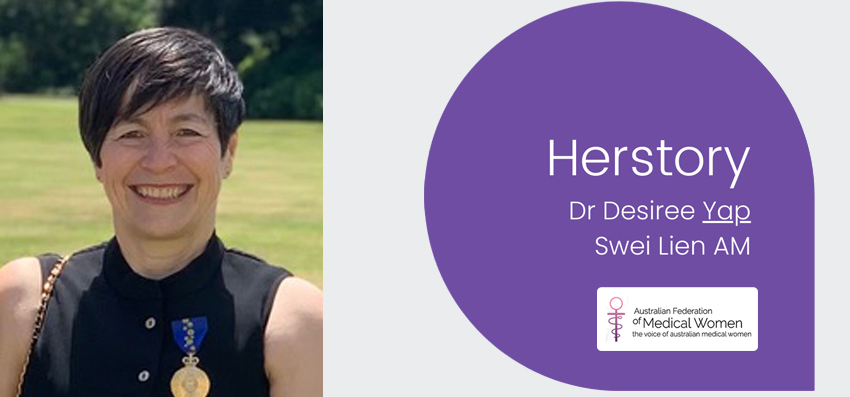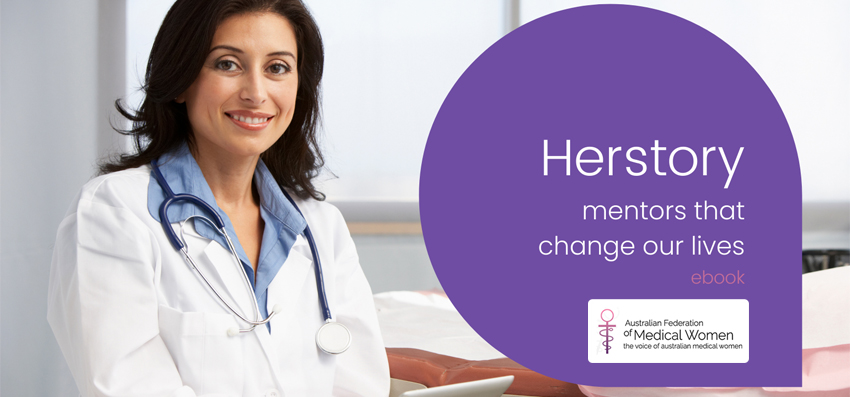Meet Dr Desiree Yap Swei Lien AM
Herstory this month features our own Dr Desiree AM, specialist gynaecologist in cervical dysplasia, esteemed AFMW member, current Vice President of Western Pacific MWIA, past President of AFMW and VMWS. Many years ago, Desiree called me at my practice and invited me to attend the WP MWIA regional conference that was taking place at the Sofitel Hotel in Melbourne. That was my first introduction to VMWS, AFMW, MWIA and the beginning of many wonderful experiences.
Hopefully by reading these vignettes, you enjoy learning something new about career development and aspects of mentoring. You are also invited to learn more about Desiree’s amazing career by connecting directly with her on LinkedIn. Read about her mentoring journey, as she kindly shares her wisdom with us in our October issue of AFMW Herstory.
This is Desiree’s story.
About Desiree
Author name: Dr Desiree Yap Swei Lien
Country born and trained: Australia (with 2 O&G training years in the UK, and medical student elective in Germany)
State membership: Victoria
Role- at work and in AFMW: Secretary, Past President / State: Secretary, Past President MWIA: Vice-President WPR MWIA
Profession/ training/ specialty: Obstetrics and Gynaecology, Master of Public Health
Year of graduation: 1987
Desiree is a specialist obstetrician and gynaecologist who has retired into gynaecology only with public health qualifications. Desiree has been a medical doctor for over 30 years with a varied career with an emphasis on women’s health and health advocacy and the professional development of women in medicine. Desiree’s was made a Member of the Order of Australia for her ‘significant service to women’s health, and to medicine.’
Mentors
The first medical mentor in my life was Dr Lorna Lloyd-Green. As she was my mother’s obstetrician (and Dame Kate Campbell our paediatrician) I am guessing it never ever occurred to me that I could not be a medical doctor. Apparently, I announced my ambitions at the age of 3 (likely eating chocolate biscuits with Lorna’s nurse whilst my mother was having her antenatal check up…). As I became older and still wanted to be a doctor, my mother would call up Lorna to ask her advice as to secondary school subject choices and ultimately advice on university choices. My mother had to leave school at 14 to support her family, so proactively sought to ask what she could not help with, from those who knew. Lorna continued to keep an eye on my career and I hope was pleased I followed her into O&G.
With respect to other mentors, there have been many. The Royal Melbourne Hospital medical Dean at the time I was a medical student was one: Roger Mellick. His views on medical education were very progressive for the time. He was wise and insightful and some of his advice remains true after all these years.
Since then, there have been a variety of mentors – mainly senior female colleagues in Obstetrics and Gynaecology, but I would be remiss not to mention my mentors amongst the nursing staff. Whilst many have been significant in different ways, I remember in particular 2 senior emergency department RN’s who took me under their wing when I was an intern and they were very kind to me. They also shared with me a wealth of clinical knowledge and skills and I continue to keep in touch with them. At that time there were fewer women in medicine, very few at the Royal Melbourne Hospital so the few female registrars and consultants were all inspirational in one way or another. In terms of O&G, again most but not all of my significant mentors were senior medical women – some from the Royal Women’s but quite a cohort were from the ‘Old Queen Vic’ – partly because I trained at Monash Medical Centre 4 years after the amalgamation of Prince Henry’s and the Queen Vic and their move to Clayton and partly because that had been where most of the senior medical women in Women’s Health had received their training.
As my ages and stages in life have changes, so has what I have needed from my mentors. Where once mentors were around skills and training decisions, this became the need for advice with balancing work and family. The latter is still a major issue for which I still have mentors, but now I am also needing mentors who help me in my leadership development as well as my transition to where I am wanting to go with the last decade or two of my career. I am now also in the amazing position in finding mentors in people who were my juniors in previous roles. That brings me great pleasure – to be outshone by my wise student! I am blessed however to have always been surrounded by wonderful mentors and can only hope that this continues.
Three Lessons Learned
- Mentors are everywhere and you need different ones for different aspects of your life. Most people are generous with their time and advice if asked.
- Not everyone is going to like or respect you, usually for reasons of their own. Be clear about your own place in the world and what sort of person you are and want to be.
- That politics and different ideas as to what constitutes ‘merit’ will most likely be an issue at some level, wherever you end up in your career. Be mindful of your contributions in those arena’s and look for mentors who play using rules you can respect. Try to ensure you are a person contributing positively in those axis as well.
Key Message to Others
Be Kind
It often costs absolutely nothing to be kind, taking small moment out of your day to answer a question or deepen a relationship. Remember to also be kind to yourself. Medicine can be a profession paradoxically, where a lack of kindness is often found. Beware of compassion fatigue and burn-out and don’t feel you have to apologise to any one for ‘putting the oxygen mask on yourself first’.
Be Empathetic
It always helps to understand where the other person might be coming from and to consider what they might really be asking or what they are really asking. It will help you solve the problems your patients come to you with more efficiently, but it will also help you understand where those around you are coming from. By understanding people better, you can manage them better – and this includes your colleagues and seniors in your hierarchy. This does not mean you have to be a doormat. It can inform your strategies in your professional dealings.
Have Personal Integrity and Purpose
Without this we are nothing. Be mindful as to why you are doing what you are doing and your drivers as to where you are going. Also remember that along that journey you have a responsibility to yourself
Thank you Dr Desiree Yap for all you do and for sharing your story with AFMW.
We hope you all look forward to reading the next instalments from some of our other members in our monthly Herstory updates.
Magdalena Simonis
President, Australian Federation of Medical Women
About ‘Herstory’
The online AFMW Herstory E-Book, gives AFMW members the opportunity to contribute to the AFMW oral tapestry, by forming a compilation of ‘our mentoring stories’, in which we honour those who have changed our lives. Making this an online AFMW story book, encourages us each to consider contributing to building this over the years, into a collection of medical women’s ‘key take home messages’, as we share the wisdom we each have gained from our own lived experiences. The ‘golden nugget of wisdom’ that we would share with someone who asked us about what we have learned.
Add Your Story
If you would like to contribute your story, please download the Herstory template (Word doc), add your details and return the completed form to [email protected]. Please also submit a photo of yourself with this. It can be a ‘selfie’ taken with a good camera that you would be happy to have others see.
Associate Professor Magdalena Simonis AM is a Past President of the AFMW (2020-2023), former President of VMWS (2013 & 2017-2020) and current AFMW National Coordinator (2024-2026). She is a full time clinician who also holds positions on several not for profit organisations, driven by her passion for bridging gaps across the health sector. She is a leading women’s health expert, keynote speaker, climate change and gender equity advocate and government advisor. Magda is member of The Australian Health Team contributing monthly articles.
Magdalena was awarded a lifetime membership of the RACGP for her contributions which include past chair of Women in General Practice, longstanding contribution to the RACGP Expert Committee Quality Care, the RACGP eHealth Expert Committee. She is regularly invited to comment on primary care research though mainstream and medical media and contributes articles on various health issues through newsGP and other publications.
Magdalena has represented the RACGP at senate enquiries and has worked on several National Health Framework reviews. She is author of the RACGP Guide on Female Genital Cosmetic Surgery and co-reviewer of the RACGP Red Book Women’s Health Chapter, and reviewer of the RACGP White book
Both an RACGP examiner and University examiner, she undertakes general practice research and is a GP Educator with the Safer Families Centre of Research Excellence, which develops education tools to assist the primary care sector identify, respond to and manage family violence . Roles outside of RACGP include the Strategy and Policy Committee for Breast Cancer Network Australia, Board Director of the Melbourne University Teaching Health Clinics and the elected GP representative to the AMA Federal Council. In 2022. she was award the AMA (Vic) Patrick Pritzwald-Steggman Award 2022, which celebrates a doctor who has made an exceptional contribution to the wellbeing of their colleagues and the community and was listed as Women’s Agenda 2022 finalist for Emerging Leader in Health.
Magdalena has presented at the United Nations as part of the Australian Assembly and was appointed the Australian representative to the World Health Organisation, World Assembly on COVID 19, by the Medical Women’s International Association (MWIA) in 2021. In 2023, A/Professor Simonis was included on the King’s COVID-19 Champion’s list and was also awarded a Member (AM) in the General Division for significant service to medicine through a range of roles and to women’s health.


